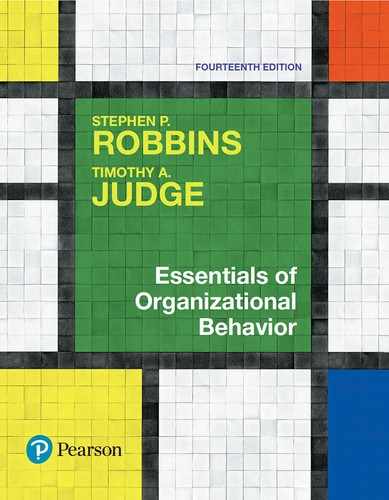Management and Organizational Behavior
The roles of a manager—and the necessary skills needed to perform as one—are constantly evolving. More than ever, individuals are placed into management positions without management training or informed experience. According to a large-scale survey, more than 58 percent of managers reported they had not received any training and 25 percent admitted they were not ready to lead others when they were given the role.8 Added to that challenge, the demands of the job have increased: the average manager has seven direct reports (five was once the norm), and has less management time to spend with them than before.9 Considering that a Gallup poll found organizations chose the wrong candidate for management positions 82 percent of the time,10 we conclude that the more you can learn about people and how to manage them, the better prepared you will be to be that right candidate. OB will help you get there.
Organizational Behavior (OB) Defined
Organizational behavior (OB) is a field of study that investigates the impact individuals, groups, and structure have on behavior within organizations, for the purpose of applying such knowledge toward improving an organization’s effectiveness. That’s a mouthful, so let’s break it down.
OB is a field of study, meaning that it is a distinct area of expertise with a common body of knowledge. What does it study? It studies three determinants of behavior within organizations: individuals, groups, and structure. In addition, OB applies the knowledge gained about individuals, groups, and the effect of structure on behavior in order to make organizations work more effectively.
To sum up our definition, OB is the study of what people do in an organization and the way their behavior affects the organization’s performance. Because OB is concerned specifically with employment-related situations, it examines behavior in the context of job satisfaction, absenteeism, employment turnover, productivity, human performance, and management. Although debate exists about the relative importance of each, OB includes these core topics:11
Motivation
Leader behavior and power
Interpersonal communication
Group structure and processes
Attitude development and perception
Change processes
Conflict and negotiation
Work design
Effective versus Successful Managerial Activities
Now that we understand what OB is, we may begin to apply some concepts. Consider the important issue of effective management. What makes one manager more effective than another? To answer the question, Fred Luthans, a prominent OB researcher, and his associates looked at what managers do from a unique perspective.12 They asked, “Do managers who move up most quickly in an organization do the same activities and with the same emphasis as managers who do the best job?” You might think the answer is yes, but that’s not always the case.
Luthans and his associates studied more than 450 managers. All engaged in four managerial activities:
Traditional management. Decision making, planning, and controlling.
Communication. Exchanging routine information and processing paperwork.
Human resources (HR) management. Motivating, disciplining, managing conflict, staffing, and training.
Networking. Socializing, politicking, and interacting with outsiders.
The “average” manager spent 32 percent of his or her time in traditional management activities, 29 percent communicating, 20 percent in HR management activities, and 19 percent networking. However, the time and effort different individual managers spent on those activities varied a great deal. Among managers who were successful (defined in terms of speed of promotion within their organizations), networking made the largest relative contribution to success and HR management activities made the least relative contribution, which is the opposite of the average manager. Indeed, other studies in Australia, Israel, Italy, Japan, and the United States confirm the link between networking, social relationships, and success within an organization.13 However, Luthans and associates found that among effective managers (defined in terms of quantity and quality of their performance and the satisfaction and commitment of their employees), communication made the largest relative contribution and networking the least. This finding is more in line with the average manager, with the important exception of increased emphasis on communication. The connection between communication and effective managers is clear. Managers who explain their decisions and seek information from colleagues and employees—even if the information turns out to be negative—are the most effective.14
 Watch It
Watch It
If your professor has assigned this, go to the Assignments section of mymanagementlab.com to complete the video exercise titled Herman Miller: Organizational Behavior.
